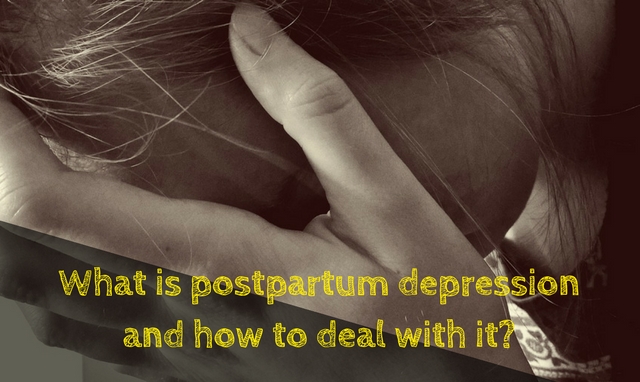
Having a baby is a life changing experience. It’ll make you see the world differently. It’ll also alter your general outlook towards life.
However, pregnancy and the post partum effects can sometimes be severe. One of these includes postpartum depression.
This refers to a continuous feeling of sadness after the overwhelming process of giving birth. This is not a very uncommon phenomenon and shouldn’t get you too worried.
Studies reveal that one out of seven women tends to experience postpartum depression.
In this post, I aim to help you with all you need to know about postpartum depression.
What is postpartum depression?
A strong overpowering feeling of sadness post giving birth is termed as postpartum depression. Anxiety and exhaustion are common features too.
Such mood disorders tend to affect the childcare regime that a mother needs to devote attention to after childbirth.
It is generally said to strike within one to three weeks after childbirth.
During this phase, it is important to seek professional medical help to cure postpartum depression.
Do not hesitate to consult a doctor as you are not at fault for having postpartum depression. Many women experience this so you are not alone in it.
Depression of this kind isn’t unnatural or very tough to treat, so feel free to contact your doctor.
What is postpartum depression isn’t hard to understand if you consult a doctor as soon as you start noticing symptoms.
Causes of postpartum depression
Hormones and thyroid
Though this has not been medically proven, changing hormones can be a major reason for postpartum depression.
Hormones control different emotions and regulate your mood. Increased levels of hormones like oestrogen during pregnancy are a fact.
These quickly drop post childbirth and are likely to cause postpartum depression.
Low thyroid hormones can potentially be a cause of postpartum depression. Sleep deprivation and fatigue can also add to causes.
Scenarios that make you likely to suffer from postpartum depression:
- A medical history with traces of depression or symptoms of it. Family history including depression too can affect you.
- Stressful events in life during pregnancy. These can include many things like a difficult pregnancy itself or a death of a loved one. Financial stress coupled with distanced family members can add to an unhappy pregnancy period.
- Negative attitudes with constant self doubt during pregnancy can also contribute. If you’ve worried too much about whether you’ll make a good mom and felt that you’ll be less attractive after childbirth, you’ve filled yourself up with negative vibes. Negative attitudes in general during pregnancy can lead to postpartum depression.
- Past experience with alcohol or drugs
What are the symptoms of postpartum depression?

A predominant feeling of sadness is the key symptom but there are several others too. These include:
- An overwhelmed feeling coupled with hopelessness.
- Tears without any concrete reason.
- Feelings of panic and stress. There might also be intermittent anxiety or fear pangs.
- Very serious mood swings.
- Eating either more than usual or significantly lesser than usual. Weight loss or gain in significant amounts might also be symptoms.
- Outbursts of anger and rage. Most of these are probably not accounted for too well.
- Physical pains and stomach problems.
- Feelings of self doubt or self harm. There might also be feeling about harming the baby.
- Having trouble in maintaining bonds with family as well as forming ones with the baby.
- Trouble falling asleep leading to a constant feeling of sleep deprivation or fatigue.
- Having trouble in making decisions or concentrating in general.
What is important to note here is that the symptoms fall under a very broad category and might actually be no cause for concern.
Only a professional doctor can diagnose you with postpartum depression. If you have any of the above symptoms persisting over a week, it is essential to see a doctor.
What are the symptoms of postpartum depression is a commonly sought question among new moms and getting adequate help is essential for timely treatment.
Treatment for postpartum depression
To treat postpartum depression, your doctor is likely to get details about your feelings. You might be needed to fill up a form too which will help a doctor discern if you have depression.
Several tests might be conducted too, like tests for thyroid hormones. There are several methods of treatment of postpartum depression based on how severe it is.
These are the most commonly used methods.
Counselling
Counselling or therapy with a professional will help you get to the root of the problem by discussing it with your therapist.
Once you get to the root cause, you will be suggested simple methods to practice regularly so that you stay away from depression.
You will be made to understand your own depression well by the therapist.
Cognitive behavioural therapy (CBT) is a type of therapy that helps you understand and change the negative outlooks.
Interpersonal therapy (IPT) is a different kind that helps you pull through difficult personal relationships by understanding them on a deeper level.
Medication
These include medicines prescribed by a doctor. These will include anti depressants, dosages of oestrogen and others.
Oestrogen plays a crucial role in menstrual cycles and also regulates a woman’s mood greatly. Oestrogen patches might be recommended for you.
Antidepressants are essentially chemicals that regulate moods through the brain.
They generally take a while before being effective. Some antidepressants have side effects too.
Be sure to check with you doctor if both are okay if you are breastfeeding your child.
During the process of breastfeeding some chemicals can go from your body to the child and that is not going to be healthy for the baby.
Do not alter dosages or stop taking medicines without consulting the doctor.
Faulty medication will only accentuate the problem instead of removing it.
Some daily regimes to make treatment easier:
While treatment is essential, there are several simple things you can practice as healthy habits to make the treatment work faster.
These regimes have shown positive results in speeding up recovery from postpartum depression.
Living a healthy life
A healthy lifestyle goes a long way in keeping depression at bay. Go for morning walks and do regular exercise.
Eat healthy foods and avoid junk food.
Vegetables, fruits and lean meats should be a part of your diet.
A good sleep cycle can be great too. Even though taking care of a baby can be strenuous, get a good amount of rest whenever possible.
Avoid drinking alcohol as it is a depressant and only worsens the situation. It can also cause adverse reactions with the medication which is dangerous.
Drugs should be out the question too. Alcohol can also pass to you baby through breastfeeding and cause further problems.
Lower stress
Try to get back to the life you had before the baby and give into some amount of leisure time by watching movies or reading books.
Think about working again, even if it is part time or freelance.
Do not make too many changes in your life right now as these can lead to added tensions.
Give in to things that make you happy like hobbies.
Improve interpersonal relationships
Once you look around, you are likely to find family and friends who are willing to help.
Get someone trustworthy to take care of the baby while you go and meet a friend or do something you enjoy.
Accept help when friends offer to lessen your burdens by looking after the baby or doing household chores.
Talking about the problem with people close to you, including your partner can go a long way in relieving you of the burden.
Keeping everything bottled up inside you is not the best way to deal with postpartum depression.
Effects of postpartum depression on the baby
With you not being able to give adequate care to your little one, there will be problems for him/her. These will include the baby crying too much.
Crying is common, but excess of it will occur when there is insufficient care. The baby will also have trouble forming bonds with you.
The baby might also be slow in picking up words and learning to talk. Behaviour problems can also occur.
To ensure that these do not happen, seek professional help when you spot symptoms of postpartum depression.
Postpartum depression… to conclude…
Postpartum depression is not a very uncommon problem but it must be dealt with as soon as you notice probable symptoms.
Leaving it untreated will only aggravate the depression and that is not desirable.
Family members might also be the first ones to notice the symptoms so do not ignore their advice when they tell you that something is strange.
You might not always understand your mood swings as well as people around you do.
Childbirth is a beautiful process and every mother should get the chance to enjoy it to the fullest.
Once treated, you will start loving watching the playful antics of your baby and previous sources of stress will cease to exist.
This will lead to healthier life, not only for you but also for your baby.




Leave a Reply